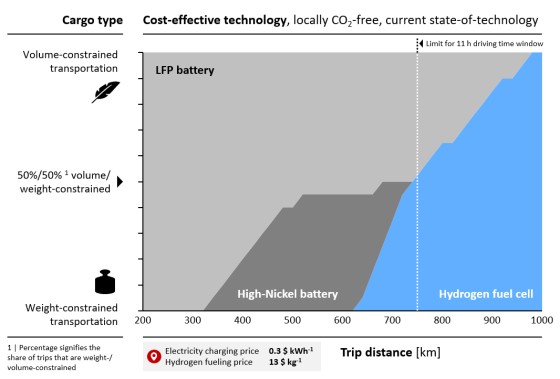
The decarbonization of long-haul transportation: A crucial contribution to "Strategy Zero Emission 2050"
To reach the United Nations’ strategic goal of an emission-free society until 2050, aside from passenger transport, freight transport needs to become independent from fossil fuels. Particularly challenging: the transformation of long-haul truck transportation. The market is characterized by price pressure and strict requirements on range, cargo capacity, and utilization of vehicles. Alternatives to diesel-powered engines such as batteries and fuel cells allow for emission-free operation, but differ in important technological properties such as efficiency, weight and charging or refueling time. Transparency on the cost impact of these properties is vital for haulers to reduce emissions, and truck manufacturers to offer attractive products.
A research group of the University of Münster has now published a cost analysis of battery and fuel cell electric trucks. The researchers quantify the competitiveness of future powertrains by modeling “Total Cost of Ownership” that include operating and capital cost as well as forgone profits due to charging times and lower cargo capacity. In different use cases, the competitiveness to diesel trucks is compared and required actions for an economical transformation of long-haul truck transportation are outlined. The researchers chose the U.S. market as case study whose decarbonization is hampered by a comparatively low diesel price.
Technological potential and energy price reductions make zero-emission trucks competitive
The researchers show that battery and fuel cell electric trucks in long-haul transportation are not competitive to diesel trucks today, yet technological levers and reductions in energy prices have the potential to bring down cost below conventional trucks. “The dynamic development of battery energy density and improvements of fuel cell efficiency will bring the cost of long-haul zero-emission trucks close to the diesel – however, for the real breakthrough, price reductions are required for fast charging and hydrogen at the highway”, explains Lukas Mauler, lead author from the Institute of Business Administration at the Department of Chemistry and Pharmacy. The competitiveness of zero-emission trucks will first be reached on shorter distances and will gradually expand to longer distances: “For trips in the U.S. market that remain below 400 miles, powertrains with long-lasting lithium iron phosphate batteries or lighter nickel-rich chemistries are most suitable. Above this threshold, the fuel cell’s weight and refueling time advantage becomes more and more attractive. But the distance threshold is dependent on regional market conditions such as energy prices and hours of service regulation”, says Lukas Mauler.
Depending on the use case, battery and fuel cell powertrains show their advantage
Aside from the distance the truck travels to complete its mission, the type of cargo plays a crucial role for the cost-effective powertrain technology choice. While lighter cargo such as parcels or refrigerators bring the truck close to its cargo volume limit, for liquids or construction materials, the weight limit is most decisive. This fact affects the decision for the most economic powertrain. “In volume-constrained transportation, lower cost lithium iron phosphate batteries are beneficial since powertrain weight plays a minor role. In the weight-constrained case, depending on the trip distance either nickel-rich cell chemistries or fuel cells are most suitable since they spare extra weight for precious cargo”, underlines Laureen Dahrendorf, co-author from the Institute of Business Administration. In the included market overview of newcomers and established truck manufacturers, trucks powered by all the analyzed powertrains can be expected in the future. The cost analysis can serve as an orientation for the truck purchase decision of haulers that know best their own use case.
Infrastructure ramp-up and transition to autonomous driving will be decisive

The detailed results of the cost analysis of future long-haul trucks by Lukas Mauler, Laureen Dahrendorf, Dr. Fabian Duffner, Prof. Dr. Martin Winter, MEET Battery Research Center, and Prof. Dr. Jens Leker, Institute of Business Administration at the Department of Chemistry and Pharmacy, have been published as research article in the “Journal of Energy Storage”.
Original publication
Lukas Mauler, Laureen Dahrendorf, Fabian Duffner, Martin Winter, Jens Leker (2022): Cost-effective technology choice in a decarbonized and diversified long-haul truck transportation sector: A U.S. case study. Journal of Energy Storage. DOI: 10.1016/j.est.2021.103891
